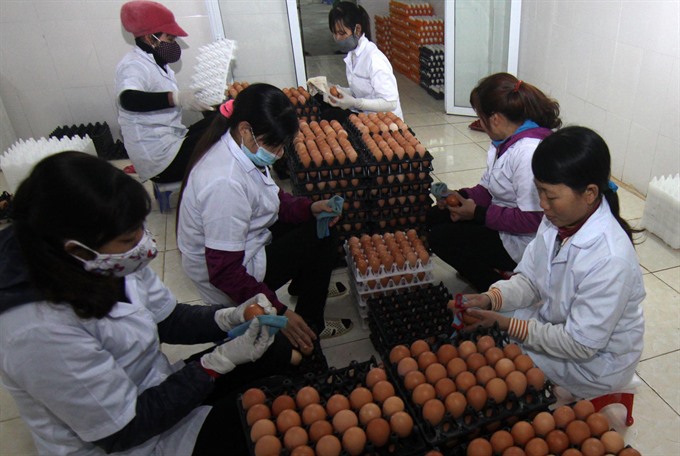 Economy
Economy

The capital city plans a 4-5 per cent export growth compared with last year.
 |
| Workers check eggs at Ba Huân Co Ltd in Hà Nội’s Quốc Oai District. — Photo VNA/VNS Vũ Sinh |
HÀ NỘI — The capital city plans a 4-5 per cent export growth compared with last year.
The ambitious target was set despite difficulties faced by key export products, such as electronics, agricultural products, textiles and garments, due to the negative impact of reduced global consumption and the shock waves of Brexit on the European economy, which is a large export market for Việt Nam.
According to the Hà Nội Statistics Department, although the city made efforts to increase exports last year, they only reached US$10.6 billion in 2016, a year-on-year increase of 1.5 per cent, far from the target growth rate of 7-8 per cent. The export of computer components and peripheral devices earned $1.29 billion, 2.7 per cent less compared with 2015.
The department’s director, Lê Hồng Thăng, attributed the drop in export turnover to the adjustment of the VNĐ/US dollar exchange rate and the euro, yen and yuan were devalued by 18 per cent, 17 per cent and 8 per cent, respectively, to stimulate export and minimise import.
Thăng said this had raised the price of raw materials and reduced consumption in the city’s export markets. Although banks lowered loan interest rates to 8 per cent, they were still 2-4 times higher than loan rates in competing export countries.
Under fierce competition pressure in the context of globalisation and with the participation in free trade agreements (FTA), only capable businesses will be able to maintain operations. This is also an opportunity to wipe out weak companies, Thăng said.
According to experts, exports from Việt Nam and its capital city will continue experiencing difficulties this year, but companies that take advantages of the FTAs with South Korea, the EU and the Eurasian Economic Union, will have an opportunity to increase trade growth.
Trần Thanh Hải, deputy head of the Ministry of Industry and Trade’s Export-Import Department, said that in order to maximise FTA advantages, businesses must seek out bigger market shares of their goods.
Under the export plan for the 2016-20 period, with a vision to 2025, the city’s industry and trade sector will strengthen promotion activities, provide businesses with more information on markets and export products, Hải said. The city will open training courses for businesses to inform them of policies and regulations in Việt Nam and other countries in the world. The information is designed to meet international commitments and overcome trade barriers.
The decisive factor in increasing competition capacity is applying advanced technologies, which will help business improve goods and service quality and reduce costs, said Hải. — VNS